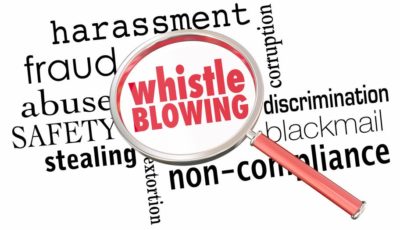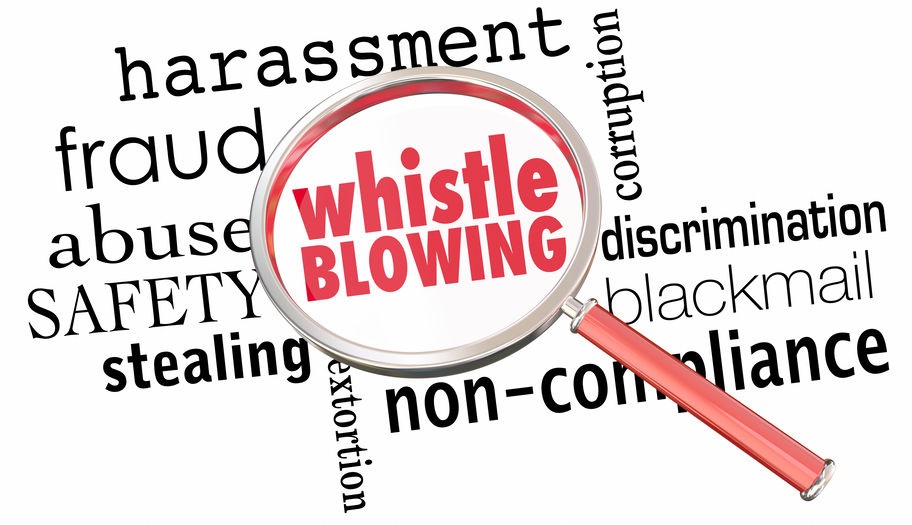Employees who blow the whistle are protected from retaliation, such as discharge, discipline, and other adverse employment actions, under federal and/or state law. Are you the victim of retaliation as a whistleblower? Here are 10 common whistleblower claims that may protect you.

- Florida Private Whistleblower Act: The FWA prevents employers of 10 employees or more from retaliating against an employee who opposes or reports the employer’s violation of a law, rule, or regulation. Employees have 2 years from the date of retaliation to file a lawsuit in court.
- Florida’s Public Whistleblower Act: The Public FWA protects public employees who disclose violations or suspected violations of law, rule or regulations or report gross mismanagement, malfeasance, misfeasance and gross waste of funds (among other things). Depending on whether the employer is a state or local employer, deadlines to pursue a claim may be between 60 to 180 days.
- Sarbanes Oxley Act: SOX prevents a publicly traded company or independent contractors of publicly traded companies from retaliating against an employee who reports various types of fraud, including mail fraud, bank fraud, and shareholder fraud. Employees have 180 days from the date of retaliation to file a claim with the Occupational Safety and Health Administration (OSHA).
- Section 11(c) of the Occupational and Safety Health Act: The OSHA Act prevents workplace retaliation against an employee of a private employer or the Postal Service who opposes workplace safety violations or otherwise asserts their rights under the Act. Other than the Postal Service, the Act does not apply to government employers. Employees must file a claim with OSHA within 30 days of the retaliation.
- Federal Whistleblower Protection Act: The Federal WPA protects covered federal workers who report waste, fraud and abuse by their governmental employer. Federal employees can file a retaliation complaint (also known as a prohibited personnel practice) with the Office of Special Counsel at any point after they knew or should have known of the retaliation.
- Taxpayer First Act: The TFA provides a cause of action to employees who report their employer’s suspected violations of the tax code to the IRS or other appropriate government agency. Employees file a retaliation complaint within 180 days of the retaliatory act.
- Consumer Product Safety Improvement Act: The CPSIA prevents a covered employer from retaliating or otherwise discriminating against an employee who reports a suspected violation of consumer protection laws—laws that protect consumers, including but not limited to product safety. If you have been retaliated for complaining about such violations, employees must initiate a claim with OSHA within 180 days of the retaliatory act.
- Consumer Financial Protection Act: The prevents covered employers from retaliating against employees who report reasonably perceived violations of the Consumer Financial Protection Bureau’s regulations or other consumer financial laws. Employees must file a claim with OSHA within 180 days of the retaliatory act.
- Dodd-Frank Act: Dodd-Frank prohibits covered employers from retaliating against an employee who reports a violation of securities laws to the Security Exchange Commission (SEC). In certain instances, Dodd-Frank may also reward employees who report such violations with a percentage of any monetary awards recovered by the SEC. Depending on the circumstances, employees have three, six or 10 years to file a lawsuit court for retaliation. Be sure to get legal advice on which deadline applies to you.
- False Claims Act: The FCA allows private citizens to report and initiate lawsuits against other persons and companies (usually federal contractors) suspected of defrauding the federal government. The FCA also protects employees who report such fraudulent practices. The statute of limitations for a FCA whistleblower retaliation case is 3 years from the retaliatory action.
Check out our previous blogs on whistleblowers and retaliation available here.

